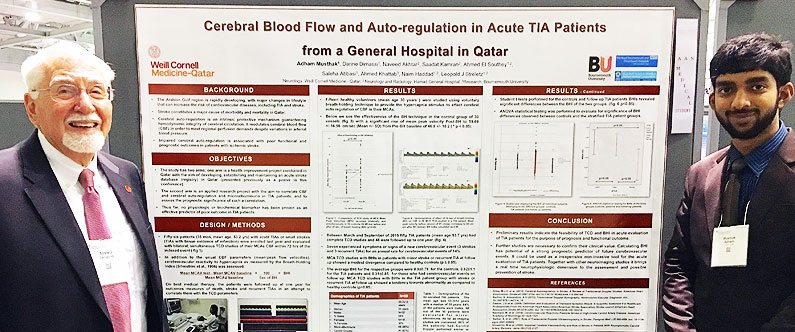Medical student’s breakthrough in stroke prediction
 Dr. Leopold Streletz and Adham Mushtak with their research poster.
Dr. Leopold Streletz and Adham Mushtak with their research poster.
A trainee physician at Weill Cornell Medicine – Qatar (WCM-Q), presented research at an international conference that could herald a sea change in the way doctors assess stroke patients.
Adham Mushtak is in the third year of the medical curriculum at WCM-Q and is currently conducting research into the likelihood of a patient suffering a stroke, and how severe that stroke is likely to be.
Working with Dr. Leopolod Streletz, associate professor (emeritus) in neurology at WCM-Q and principal investigator of the research, Adham submitted the abstract ‘Cerebral blood flow and auto-regulation in acute TIA patients from a general hospital in Qatar’ to the American Academy of Neurology. The academy then invited him to present his work at their annual conference, which is attended by international neurology specialists.
Adham explained that the research involves a non-invasive technique to ascertain the likelihood of a person suffering a stroke, and how severe that stroke will be.
To do this, Adham and Dr. Streletz use ultrasound to measure the velocity of the blood flow inside the blood vessels of the brain. The patient is then asked to hold their breath for 30 seconds. If the blood velocity does not increase, then the patient is at risk of a stroke.
Adham said: “This has never been done before with blood vessels in the brain; it’s a pioneering project. So far, we’ve worked with 54 patients in the study but this will be increased to 120 people and we will follow them for the next two years.
“With regards to the benefits for the community, if we find that this is a reliable prognostic resource, it could become a quick, simple and non-invasive method to determine a patient’s susceptibility to strokes for emergency physicians across the world.”
Adham, who is 23 and grew up in Qatar, said that the study is being carried out in partnership with researchers and physicians at Hamad Medical Corporation and Bournemouth University in the UK and he said that the American Academy of Neurology conference had been a real “eye-opener”.
He said: “I met a lot of people and I had a lot of questions answered about neurology sub-specialties giving me a clearer picture of the career paths within the subject.
“I’d also like to thank WCM-Q as they provided me with a financial grant to cover the cost of travelling to the conference, and Dr. Streletz for all his support and guidance.”